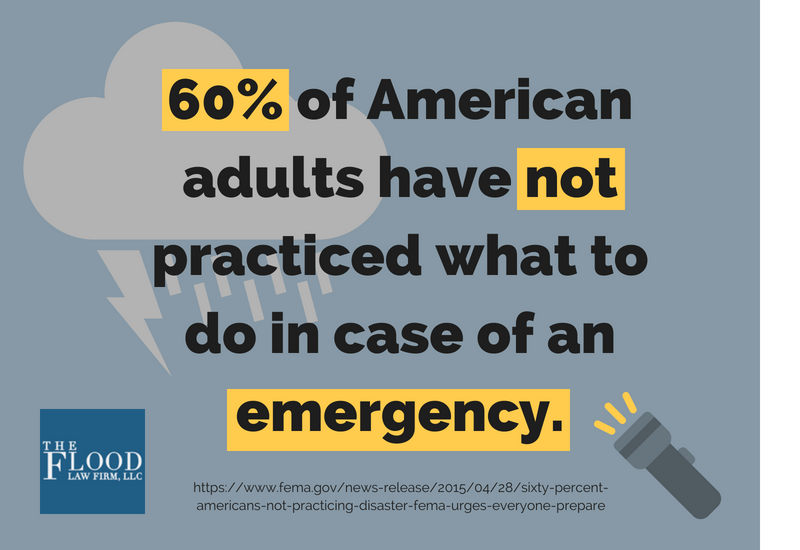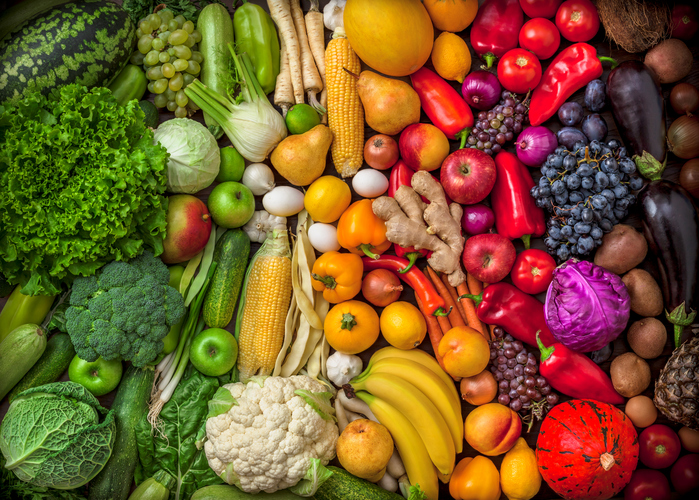
You've got plans this summer, no doubt. The last thing you and your loved ones need is an injury or accident to cut in on those long-awaited plans for fun. No matter the time of year, proper safety and prevention is always in season.
The Flood Law Firm wants to help ensure your summer starts off right by challenging your family with the NSC’s 4 areas of preventable safety measures.
Did you know?: The National Safety Council (NSC) reported a shocking 161,374 avoidable deaths and 44.5 million preventable injuries in 2016?
It’s time to improve these statistics! With June being National Safety Month, it’s the perfect time to think of how you and your family can take simple steps to help prevent potential disaster.
4 Safety Points for Every Family
The NSC focuses on the following safety topics:
- Emergency Preparedness
- Physical Wellness
- Slips & Falls
- Driver & Vehicle Safety

Be safe and smart, starting this summer! Read on to learn how.
1. Emergency Preparedness
Emergencies can happen anywhere, anytime. An alarming 60% of American adults have not practiced what to do in case of a disaster (Federal Emergency Management Agency).
The following tips can help keep you and your loved ones safe in case of an emergency:
- Prepare for natural disasters. In Connecticut, this could mean thunderstorms, flash floods, snowstorms (in the winter), hurricanes and tornadoes. Evacuate if instructed to do so by emergency officials. Plan on where you can stay for a few days if you have to leave.
- Create an emergency kit for your home and car:
Home Kit - should include things like non-perishable food, enough water for three days, a hand-crank or battery-powered flashlight, radio and extra batteries, first aid kit, plastic sheeting and duct tape for broken windows or a leaky roof and a whistle to signal for help.
Car Kit - should include things like a spare tire, wheel wrench, tripod jack, jumper cables, tool kit, compass, duct tape, car charger, flashlight and extra batteries, rain poncho, reflective vest , fire extinguisher, reflective triangles, first aid kit, nonperishable food, water, warm clothing and blankets.
- Create an emergency plan. Determine a safe place where you and your family can go in case of disaster. Learn how to shut off your utilities when necessary.
- Participate in emergency drills at work/school. Be a good participant and pay attention to the lessons taught.
- Store important documents and phone numbers in a fireproof safe or safe deposit box.
- Learn CPR. Take a class in CPR training in person or use the NCS First Aid app.
- Change smoke alarm batteries at least once a year. A working smoke detector cuts the odds of dying in a home fire by half (National Fire Protection Association).
2. Physical Wellness
By making a few changes to your daily lifestyle, you can start on a path of greater overall mental, physical and spiritual health.
Did you know that if you do the following five things, you could save up to 50% on healthcare costs?
- Walk 30 minutes per day
- Eat healthy foods
- Don’t smoke
- Have a waist size less than half your height
- Drink alcohol only in moderation

Other ways to improve your overall wellness include:
- Use the stairs instead of using the elevator
- Have stretching breaks throughout your day, especially if you sit for long periods
- Get regular checkups and physicals
- Watch out for fatigue from sleep deprivation. Make your bedroom more conducive to sleep and avoid caffeine and alcohol. Remember that children and teens need more sleep than adults.
- Drink more water. Aim to drink at least half of your body weight in ounces each day.
- Eat enough variety of fruits and vegetables to match the colors in a rainbow. This will help ensure you get a broad range of nutrients.
- Know how many calories you need to stay at a healthy weight.
- Walk more. Taking 10,000 steps each day is key to avoid a variety of health conditions like high blood pressure, high cholesterol, diabetes, stroke, or heart disease.
3. Slips & Falls
Most people don’t think about slips and falls until they happen. However, they more prevalent than most people think. In fact, falls are the third leading cause of unintentional deaths for all ages and the number one cause of death in adults 65 and older.
Fortunately, most falls can be prevented with a few simple steps:
- Remove clutter from walkways, stairs and doorways
- Install night lights in bathrooms, hallways and other areas to prevent tripping at night
- Wear proper footwear for every activity
- Clean up spills immediately
- Place non-slip adhesive strips on stairs and non-skid mats in the shower
- For older adults, install grab bars near showers and toilets, and rails on both sides of stairs
- Avoid cell phone use when walking
- Pay attention while walking in busy areas like airports and shopping centers
- Avoid distractions like wearing headphones when walking

Sometimes falling can’t be avoided. When this happens, try to fall correctly:
- Protect your head by tucking it in as you pivot to the side
- Bend your elbows and knees, and try to fall on the fleshy part of your body
- Shift body weight to minimize the impact
- Avoid being rigid and panicky, instead, loosen up as you fall
- Don’t fight the fall – try to relax and roll with it
4. Driver & Vehicle Safety
Most people consider themselves safe drivers. Yet, did you know that 94% of motor vehicle accidents involve human error?
You can help keep our roads safer by avoiding dangerous driving behaviors:
- Don’t drive impaired. This includes with a lack of sleep, after using alcohol, drugs, over the counter and prescription medication.
- Avoid cell phone use while driving
- Ensure all occupants of your car are secured in proper restraints or seatbelts
- Practice safe driving with your teen and emphasize the importance of not driving while distracted
- Never leave a child alone in a car
- Keep your car locked when not in use
Vehicle safety is just as important as driver safety:
- Regularly check your vehicle for recalls at checktoprotect.org and stay up to date on safety features in your car at MyCarDoesWhat.org
- Pay attention to your vehicle’s alerts and warnings
- Have your car inspected regularly
- Keep up-to-date with consistent oil changes
- Maintain your vehicle to keep it functioning, including clearing the vehicle of mud, ice and snow

With the onset of outdoor activity, travel and vacation, there's no better time than this summer to consider how to keep yourself and your family injury free.
